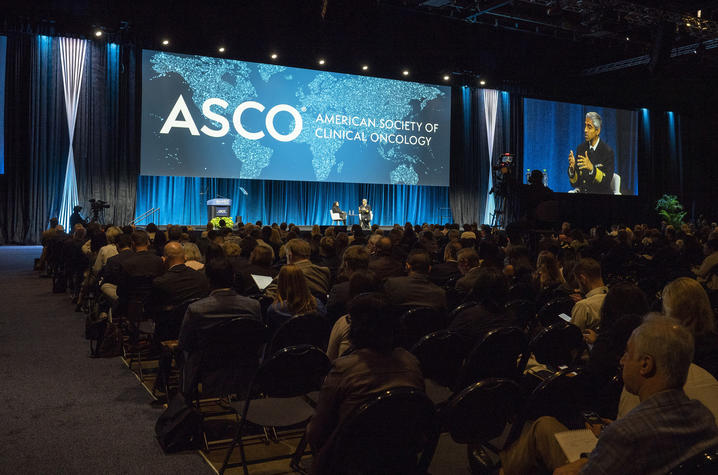Markey physicians, scientists share latest findings at ASCO

University of Kentucky Markey Cancer Center physicians and scientists shared their latest findings at the American Society of Clinical Oncology's (ASCO) annual meeting in Chicago May 31 to June 4.
The largest oncology gathering in the world, the event allows thousands of experts to discuss the latest advancements in cancer care and enables research collaborations that lead to better treatments and patient outcomes.
Markey-led studies selected for the 2024 conference included some of the cancer center’s latest contributions to lung cancer research.
Hematology and oncology fellow Aaron Pruitt, M.D., presented research that found distinct differences in tumor biology among younger adults with non-small cell lung cancer. Future research to better understand these differences could lead to more personalized therapies.
Medical oncologists John Villano, M.D., Ph.D., and Ralph Zinner, M.D., shared research focused on immunotherapy treatments for patients with lung cancer. Villano’s patient outcome study suggests certain immunotherapies could be a good treatment option for lung cancer patients with brain metastasis. Zinner presented a clinical trial for advanced non-small cell lung cancer that introduces immunotherapy earlier than the standard of care – the new approach could enable surgery for some patients previously considered inoperable.
While quitting smoking significantly reduces the risk of lung cancer and several other cancers, the health benefits of quitting extend far beyond prevention. This is especially true for patients with cancer. Markey surgeon Timothy Mullett, M.D., presented results from the "Beyond ASK" health care quality improvement project, which improved the delivery smoking cessation support for patients with cancer.
Studies presented at ASCO by medical oncologist Snigdha Nutalapati, M.D., and gynecologic oncology fellow Taylor Rives, M.D., also shared new insights on the molecular characteristics of appendiceal and endometrial cancers. Nutalapati found that genetic mutations in a protein called KRAS are linked to better outcomes in appendiceal cancers. Rives’ research shows that Appalachian patients with endometrial cancer were more likely to have advanced stage disease and tumors with mutations of a protein called EVI5. Their findings could lead to the development of new targeted treatments for these cancer types.
A full list of the Markey-led abstracts presented and published as part of ASCO is below.
Presentations
Timothy Mullett, M.D.: Improving delivery of smoking cessation assistance for patients with cancer: Results of the Beyond ASK quality improvement
Snigdha Nutalapati, M.D.: KRAS mutations and their prognostic implications in appendiceal cancers
Aaron Pruitt, M.D.: Young adults (YA) with non-small cell lung cancer (NSCLC): Snapshot of the oncogenic drivers and immune landscapes
Taylor Rives, M.D.: Comparison of the clinical and genomic profiles of endometrial cancer in Appalachian and non-Appalachian patients
John Villano, M.D., Ph.D.: Immunotherapy outcomes and profile in lung cancer brain metastases
Publications
Zena Chahine, M.D.: Correlation between number of molecular mutations and outcomes in de novo acute myeloid leukemia
Aaron Pruitt, M.D.: Young lung adenocarcinoma: Molecular analysis pointing to early acquisition of aggressive mutations
Lovoria B. WIlliams, Ph.D.: Perspectives of facilitators and barriers to cancer clinical trial participation: A mixed-methods study
More from this series Research Priorities - Cancer
Credits
Elizabeth Chapin (Public Relations & Strategic Communication)


